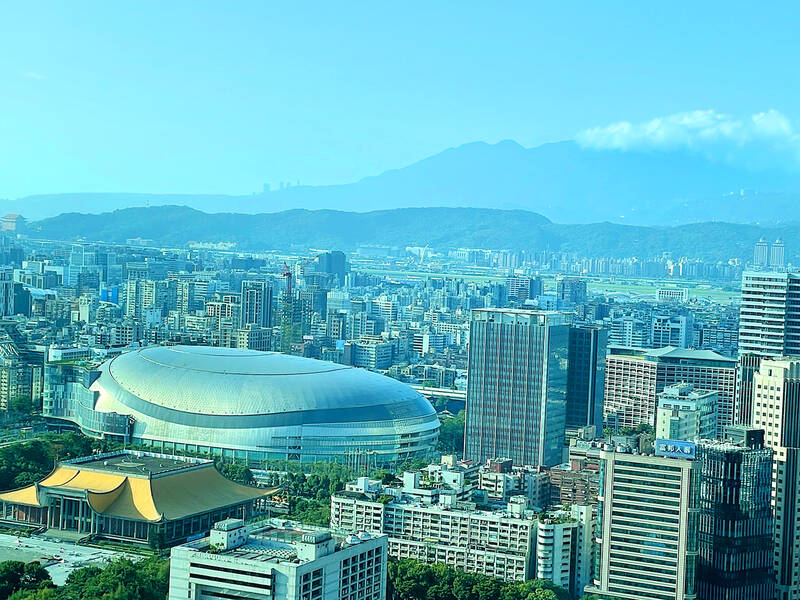Property transactions last month totaled 18,565 units in Taiwan’s six special municipalities, representing an increase of 8.6 percent from October, as builders wrapped up construction and turned over ownership to buyers ahead of the year’s end, brokers said.
However, the volume represents a 28.5 percent plunge from November last year, as interest rate hikes and economic uncertainty slowed purchase decisions.
Construction on presale housing projects in Taipei, Taoyuan, Taichung and Kaohsiung were completed and delivered, bolstering the number of deals to 1,999 units, 3,724 units, 4,286 units and 2,708 units respectively, Evertrust Rehouse Co (永慶房屋) deputy research manager Chen Chin-ping (陳金萍) said.

Photo: Hsu Yi-ping, Taipei Times
Property transfers in New Taipei City reported a 10 percent rise to 4,238 units, and shrank 0.7 percent to 1,610 units in Tainan, Chen added.
Taiwanese developers often aim to complete projects by the year’s end to meet buyers’ needs and strengthen annual financial statements.
The housing market has not been spared from an economic slowdown in Taiwan and heightened fear of recession in the US and Europe, where central banks are raising interest rates to tame inflation despite job losses and economic downturns.
Transactions in the first 11 months of this year fell 7 percent from a year earlier, and the pace of retreat has been widening each month, Chen said.
The decline is set to persist in light of growing mortgage burdens, softening GDP growth and a negative wealth effect linked to TAIEX corrections, Chen said.
Taiwan’s central bank has hiked interest rates three times this year and is widely believed to make another increase later this month.
The decline is most evident in Kaohsiung and Tainan at 14.3 percent and 12.4 percent respectively, Great Home Realty Co (大家房屋) lead researcher Mandy Lang (郎美囡) said, but added that it is partly due to a high base last year.
The housing market in southern Taiwan enjoyed a two-year boom on the back of investment and expansion plans of local chipmakers and international equipment suppliers.
The property fever subsided after local tech firms cut and postponed capital spending due to order cancelations and sluggish end-market demand, Lang said.
H&B Business Group (住商不動產) research director Jessica Hsu (徐佳馨) said the lack of consensus over house prices have also dragged transactions.
Large developers have deep pockets and tend to hold firm on prices, as this strategy has paid off in the past, Hsu said.

MULTIFACETED: A task force has analyzed possible scenarios and created responses to assist domestic industries in dealing with US tariffs, the economics minister said The Executive Yuan is tomorrow to announce countermeasures to US President Donald Trump’s planned reciprocal tariffs, although the details of the plan would not be made public until Monday next week, Minister of Economic Affairs J.W. Kuo (郭智輝) said yesterday. The Cabinet established an economic and trade task force in November last year to deal with US trade and tariff related issues, Kuo told reporters outside the legislature in Taipei. The task force has been analyzing and evaluating all kinds of scenarios to identify suitable responses and determine how best to assist domestic industries in managing the effects of Trump’s tariffs, he

TIGHT-LIPPED: UMC said it had no merger plans at the moment, after Nikkei Asia reported that the firm and GlobalFoundries were considering restarting merger talks United Microelectronics Corp (UMC, 聯電), the world’s No. 4 contract chipmaker, yesterday launched a new US$5 billion 12-inch chip factory in Singapore as part of its latest effort to diversify its manufacturing footprint amid growing geopolitical risks. The new factory, adjacent to UMC’s existing Singapore fab in the Pasir Res Wafer Fab Park, is scheduled to enter volume production next year, utilizing mature 22-nanometer and 28-nanometer process technologies, UMC said in a statement. The company plans to invest US$5 billion during the first phase of the new fab, which would have an installed capacity of 30,000 12-inch wafers per month, it said. The

Taiwan’s official purchasing managers’ index (PMI) last month rose 0.2 percentage points to 54.2, in a second consecutive month of expansion, thanks to front-loading demand intended to avoid potential US tariff hikes, the Chung-Hua Institution for Economic Research (CIER, 中華經濟研究院) said yesterday. While short-term demand appeared robust, uncertainties rose due to US President Donald Trump’s unpredictable trade policy, CIER president Lien Hsien-ming (連賢明) told a news conference in Taipei. Taiwan’s economy this year would be characterized by high-level fluctuations and the volatility would be wilder than most expect, Lien said Demand for electronics, particularly semiconductors, continues to benefit from US technology giants’ effort

‘SWASTICAR’: Tesla CEO Elon Musk’s close association with Donald Trump has prompted opponents to brand him a ‘Nazi’ and resulted in a dramatic drop in sales Demonstrators descended on Tesla Inc dealerships across the US, and in Europe and Canada on Saturday to protest company chief Elon Musk, who has amassed extraordinary power as a top adviser to US President Donald Trump. Waving signs with messages such as “Musk is stealing our money” and “Reclaim our country,” the protests largely took place peacefully following fiery episodes of vandalism on Tesla vehicles, dealerships and other facilities in recent weeks that US officials have denounced as terrorism. Hundreds rallied on Saturday outside the Tesla dealership in Manhattan. Some blasted Musk, the world’s richest man, while others demanded the shuttering of his